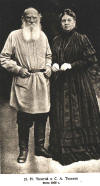
It Happened
in History!
(Go to
It Happened in History Archives)
|
As a young man, Tolstoy enjoyed drinking, gambling, and running with beautiful women. Only his guilt kept him from devoting his life totally to debauchery. About the time he began keeping a diary, he wrote that he had contracted venereal disease, for which he underwent treatment in 1847. He wrote, too, about why he couldn't help breaking the rules that society had made to protect itself from people such as he: people always try to stop themselves from doing what they really want to do. That notion would become a recurring theme in his writing throughout his life. In 1851, after racking up heavy gambling debts, Tolstoy accompanied his older brother to the Caucasus, where he joined an artillery regiment, eventually seeing service in the Chechens and the Crimea. He began writing realistic stories about the military battles he saw firsthand--one of the first writers to describe the horror and chaos of war realistically. In the 1850s, Tolstoy published the autobiographical trilogy, Childhood (1852), Boyhood (1854), and Youth (1857). At the same time, Russia was still saddled by a medieval economic system. Most of the peasants were enslaved as serfs. Tolstoy didn't believe that was right; so he opened a school for peasants on his family's estate before helping to found 20 more schools in neighboring villages. He believed in freedom of information and allowed his students to study whatever they desired. He was also editor of an educational journal in which he wrote that the upper classes had as much to learn from peasants as peasants had to learn from the upper classes. In 1862, Tolstoy married Sonya Andreyevna Behrs (1844-1919), who eventually bore him 13 children. The author often claimed that marriage was the best thing that had ever happened to him. "Domestic happiness has swallowed me completely." His wife also served as a loyal secretary, copying and editing all of his manuscripts by hand. She copied the sprawling manuscript for War and Peace (1868) four times. It was his masterpiece.
War and Peace reflected Tolstoy's view that all is predestined, although we cannot live unless we imagine that we have free will. He reserved his harshest judgment for Napoleon, who thought that he could control events. Pierre Bezukhov, who wanders on the battlefield of Borodino and sees only the confusion and horror of war, comes closer to the truth. Great men are for him ordinary human beings who are vain enough to accept responsibility for the life of society, yet unable to recognize their own impotence in the cosmic flow.
After Anna Karenina, Tolstoy renounced all of his earlier works. "I wrote everything into Anna Karenina," he said, "and nothing was left over." Voskresenia (1899, Resurrection) was Tolstoy's last major novel. In it, Prince Dmitrii Ivanovich Nekhliudov abandons prostitute Ekaterina Maslova with their child as a young man. The novel begins when Maslova is called to court on charges of murdering a client. Nekhliudov is a member of the jury. He realizes that he also is accused, although in the court of his own conscience.
Leo Tolstoy, who once said, "In the name of God, stop a moment, cease your work, look around you," died of pneumonia on November 20 (New Style calendar), 1910, at a remote railway junction. Eight years after his death, his wife was heard to remark, "I lived with Lev Nikolayevich for forty-eight years, but I never really learned what kind of man he was." Tolstoy's collected works, which were published in the Soviet Union in 1928-58, consist of 90 volumes.
Discover Leo Tolstoy
Indulge
Yourself - Check Out Today's Best-Selling |
- HOME -





